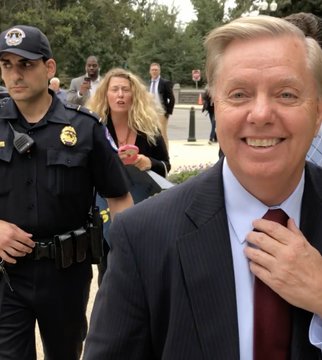Memes helped elect Donald Trump. Now well-funded conservative groups are using them to proselytize.
APRIL 2, 2019
Benny Johnson took to the stage at the convention center in Palm Beach, Florida, before an audience of cheering young Trump supporters in December to lead a session titled “How to Own the Libs.”
“I ask myself every day: How do we own the libs?” said Johnson, at the time a reporter for the right-wing Daily Caller. “How do we do it in a way that makes a difference? Because these people deserved to be wrecked.”
According to Johnson, the answer to that question is memes. These bits of humor or political propaganda—generally images overlaid with a caption designed to go viral—are best known for littering social media, but some experts think they might have helped elect Donald Trump. Or as notorious internet troll Chuck Johnson has said, “We memed the president into existence.”
Following that unexpected meme-driven success, well-funded conservative groups are making a more organized push to train young internet-savvy right-wingers in the art of meme-making, enlisting a growing army in what they see as the coming meme war of 2020. Turning Point USA, the conservative campus group that organized the conference, is merely one of these organizations seeking to sway hearts, minds, and elections via meme trainings. And it’s clear that when it comes to political memes, the left—which has never taken them very seriously—is trailing the right badly, and falling even further behind.
“Right-wing speaker training has been around for decades,” says Angelo Carusone, president of the liberal media watchdog group Media Matters, which did a study of Facebook memes last summer. “Memes are a new front in the asymmetry. What you’re looking at here with memes is storytelling around the bend, and what you’re seeing is the future.”
Memes are best known for littering social media, but some experts think they might have helped elect Donald Trump president.
Trump’s presidential campaign keyed into the power of memes early on, monitoring obscure meme sites and boosting pro-Trump images and videos onto mainstream platforms like Facebook. Facebook’s algorithms favor images and videos over more nuanced text posts or links to news articles, so pro-Trump memes quickly went viral. During the campaign, memes also helped spread misinformation about Hillary Clinton’s health and the Pizzagate conspiracy theory that prompted an armed North Carolina man to show up at a DC pizza parlor to break up a nonexistent child sex ring supposedly led by Democratic Party operatives.
Perhaps no one understood the effectiveness of memes better than former Trump campaign strategist Steve Bannon, who had served as executive chairman of the far-right publication Breitbart News. In 2016, only 5 percent of Breitbart‘s posts were of images, but those images accounted for half of the site’s most-shared posts on Facebook.
Jeff Giesea, a consultant who has worked with venture capitalist Peter Thiel and the Koch brothers, is a self-described “memetics” expert. During the 2016 campaign, he joined with men’s rights agitator Mike Cernovich to organize MAGA3X, a grassroots army of online trolls who worked to meme Trump to the White House. The effort produced tens of thousands of social media accounts, all working in concert to promote Trump, with a heavy emphasis on iconography. They even created a flash-mob meme generator to make it easy for Trump supporters to hook up in real life.
Giesea has long argued that memes are such a powerful tool they should be used as cyberwarfare to combat propaganda from ISIS and other foreign threats. In 2015, he wrote in a NATO journal on information warfare that “it seems obvious that more aggressive communication tactics and broader warfare through trolling and memes is a necessary, inexpensive, and easy way to help destroy the appeal and morale of our common enemies…Memetic warfare is about taking control of the dialogue, narrative, and psychological space. It’s about denigrating, disrupting, and subverting the enemy’s effort to do the same.”
Subscribe to RiseUpTimes.org Support independent media.
The same could be said of memes in politics. Cheap, subversive, and designed to provoke an emotional response, memes are a disruptive form of information guerrilla warfare. Republicans have gotten Giesea’s message, while Democrats have all but ignored it.
“Right-wing speaker training has been around for decades,” says Media Matters president Angelo Carusone. “Memes are a new front in the asymmetry.”
Johnson’s skill in this area launched him to Washington media fame for a while, until he was ousted from BuzzFeed and then the Independent Journal Reviewafter being accused of plagiarism. He seems to have found his calling with Turning Point USA, the conservative campus activist group that sponsored the student convention in Palm Beach and is itself something of a meme factory.
Founded in 2012, TPUSA got its startup funding from Foster Friess, a wealthy Republican donor, and it has since raked in donations from the oil and gas industry and organizations affiliated with the Koch brothers. With a budget of more than $8 million last year, TPUSA amplifies its campus presence by churning out endless “Big Government Sucks” memes on Instagram, Twitter, and Facebook.
 Turning Point USA
Turning Point USA
Like most memes, a few of TPUSA’s are clever and spread far, and many more have been trashed by internet trolls, who have created a whole meme subgenre they call “Toilet Paper USA.” Johnson was on hand in Florida to help TPUSA members up their game.
Johnson started his tutorial with “based Lindsey Graham,” a video montage of the South Carolina senator’s angry performance during the contentious confirmation hearing of Supreme Court Justice Brett Kavanaugh, who was accused of sexually assaulting a woman in high school. “That is a special moment,” he explained, noting that Kavanaugh was confirmed in spite of the allegations. “In your lifetime, there has never been a culture war that conservatives have won except for this.”
He proceeded to walk the audience through the evolution of Graham memes that went viral during the hearing and may have helped change public opinion on Kavanaugh. On the big screen, Johnson showed photos and a video he had taken of Graham coming out of the Capitol after a day of hearings. In the video, Graham is coolly adjusting his tie and smiling, while in the background, a police officer restrains a hysterical-looking woman who’s screaming at him about Kavanaugh. Johnson tweeted that he had just taken “the most thug life @LindseyGrahamSC photos of the entire Kavanaugh saga.”
From there, the internet took care of the rest. “Did this sucker meme?” Johnson asked, laughing. The answer was yes. Creative internet users tweaked and photoshopped the image, both still and video, as it spread. Johnson showed one meme of the tie-adjusting Graham superimposed on the burning Twin Towers. Then one featuring Joe Biden planting a kiss on the screaming woman. And finally, one that turned Graham into a “thug life” rap video star.
In February, TPUSA hired Johnson to do this sort of thing full time as its chief creative officer, a sign of just how seriously well-funded pro-Trump organizations are taking the business of memes.
The TPUSA conference also included a second, more interactive session on memes, hosted by two minor Instagram stars, Rogan O’Handley (Instagram handle DC_Draino) and Grant Godwin (the_typical-liberal), who got into the nuts and bolts of the art form—or, as Godwin explained, how to get your Pepe the Frog memes to go viral.
Two weeks earlier, meme training got top billing at the American Priority Conference, which billed itself as an “America First,” pro-Trump political gathering. Speakers included Roger Stone, the longtime Trump associate who was indicted the next month for obstruction and false statements in the special counsel investigation, and Anthony Scaramucci, who lasted less than a week as White House communications director. The conference featured a session on memetics by Tom Shadilay, a producer for Mike Cernovich. (Shadilay’s name may itself be a meme: It’s a popular hashtag on Gab, the social media site favored by the far right, and a code word for trolls on 4chan. Shadilay is the name of a 1986 Italian disco song by a band called P.E.P.E., whose album art featured a cartoon frog that resembles Pepe the Frog. Tom Shadilay does not appear to have any internet presence before his Twitter account was created in May 2017. He stopped responding to my emails after I asked whether that’s really his last name.)
In January, Liberty Con, a national convention of libertarian students, offered advice from David Gay, a libertarian activist who runs the Facebook group Liberty Memes, which has nearly a half-million followers spreading his political message through memes. (Until late 2016, Giesea, the meme expert, was on the board of Students for Liberty, which sponsored the conference.)* Johnson has four events scheduled this month on college campuses on “winning the meme wars.”
Boston University professor Gianluca Stringhini studies memes for a living. When I told him that well-funded right-wing organizations were specifically training activists for the next great meme war, he was surprised. Typically, he says, memes are seen as organic, emerging from the dark corners of the internet, not propaganda directed by people in politics. “Memes are tools for information warfare,” he says. “Probably this is a new way of doing politics. A new weapon that campaigns can use.”
It’s not clear exactly whether memes do, in fact, change public opinion, but conservative groups working to train grassroots troops seem to think so. So do the Russians. In the 2018 report commissioned by the Senate Intelligence Committee to investigate the Internet Research Agency, a Russian troll farm that meddled in the 2016 presidential election, researchers discovered that the IRA was especially fond of memes put out by TPUSA. Using accounts that it created to look like ordinary Americans and spread misinformation and propaganda, the IRA gave TPUSA memes a boost across multiple social media platforms. But the researchers couldn’t determine exactly what the impact of all those memes was.
Last year, Stringhini and six colleagues published a study on the origins of memes, analyzing more than 2 billion social media posts on Twitter, 4chan, Reddit, and Gab, to figure out where the most popular memes get their start. Stringhini says the most trafficked memes start on right-wing internet forums, places like 4chan’s politically incorrect /pol/ channel and Reddit’s /r/the_Donald/subreddit. From there, the far right has been extremely successful in getting its stuff to take off on mainstream platforms. Stringhini notes that after the 2016 presidential election, Trump’s campaign spokeswoman, Katrina Pierson, tweeted her thanks to 4chan and Reddit users for making it all happen, putting a sharp point on how much people on the right believe that memes are influencing public opinion.
As a result, conservative groups seem to be incorporating memes into their training arsenal for grassroots activists in a way that has no parallel on the left. In fact, “the left can’t meme” is itself a subgenre of memes, reflecting an idea accepted on both ends of the political spectrum that progressive activists are really bad at this form of political warfare.
One potential exception is long-shot Democratic presidential candidate Andrew Yang, who has recently catapulted to fame thanks to memes. But those memes are coming from the same sources, on Reddit and 4chan, that promoted Trump, not from liberal groups, creating a bizarre movement of Yang fans among white nationalists.
Media Matters’ Carusone says people on the left are more concerned with nuanced facts and gray areas that can’t always be boiled down accurately into a photo with a caption. On the left, he says, “every meme has to have a million qualifiers, so that it’s no longer a meme. It’s a Medium post.” Conservatives, on the other hand, tend to communicate their ideas “in ways that are very reductionist. They’re also much more comfortable lying, and their audiences are much more likely to accept it.”
Benny Johnson has his own take on what makes a good political meme. The first step for successful lib ownership, he told the students assembled in Palm Beach, is to “challenge the culture,” as Graham did during the Kavanaugh hearings. Second, “join the conversation” by creating an interaction, but be sure it will “demonstrate the superiority of conservative ideas.”
As an example, he played a goofy video he made with Federal Communications Commission Chairman Ajit Pai. In the video, Pai is dressed like Santa Claus, wielding a light saber, and he defends his plan for “internet freedom” in response to criticism of the Trump administration’s move to end net neutrality. “We were trolling the internet,” Johnson said. And it worked.
He flashed through a host of viral memes that took off after the video was posted. In the video, there’s a shot of Pai in front of a screen eating popcorn and watching a movie. Meme-makers have swapped in clips to make it look like Pai is watching Hitler rallies or the burning Twin Towers. Even Luke Skywalker weighed in:
The third step in successful lib ownership, Johnson instructed the crowd, was critical: “Have more fun than the left.” He played a video he had made in 2015 of Texas Sen. Ted Cruz cooking bacon on a machine gun. “Can you think of three thing libs hate more?” he exclaimed with a laugh. “Ted Cruz, bacon, guns.” All the ingredients for a good meme.
Finally, Johnson concluded: “Smile. You’re on the winning side.”
Correction: An earlier version of this article misstated the timing of Giesea’s tenure on the board.
Editor's picks
- Casinos Not On Gamstop
- Casino Sites Not On Gamstop
- Non Gamstop Casinos
- UK Online Casinos Not On Gamstop
- Migliori Siti Di Casino Online
- Best Casinos Not On Gamstop
- I Migliori Casino Non Aams
- Migliori Casino Non Aams
- Betting Apps UK
- UK Casino Not On Gamstop
- Non Gamstop Casinos
- Sites Not On Gamstop
- Casino Sites Not On Gamstop
- Non Gamstop Casino
- Non Gamstop Casino Sites UK
- Gambling Sites Not On Gamstop
- Casino En Ligne France
- Online Casinos
- Online Casinos Nederland
- Non Gamstop Casinos
- Casinos Not On Gamstop
- Betting Site
- Best Non Gamstop Casinos
- Non Aams Casino
- UK Casino Not On Gamstop
- Non Gamstop Casino UK
- Meilleur Casino En Ligne En Belgique
- Meilleur Casino En Ligne Belgique
- Migliori Siti Casino Non Aams
- Meilleur Site De Pari En Ligne
- Meilleur Casino En Ligne Français
- 익명 카지노
- Meilleur Casino En Ligne 2026
- Meilleur Casino En Ligne
- Casino Non Aams Prelievo Immediato
- Meilleur Casino En Ligne France
- Meilleure Casino En Ligne
- 꽁머니 토토
- Tortuga Casino France





